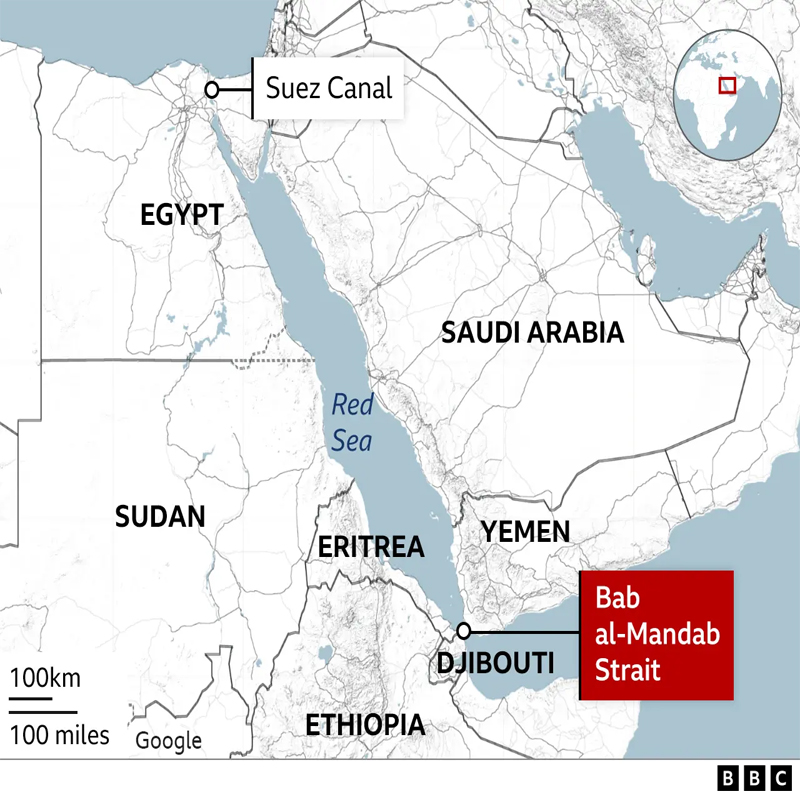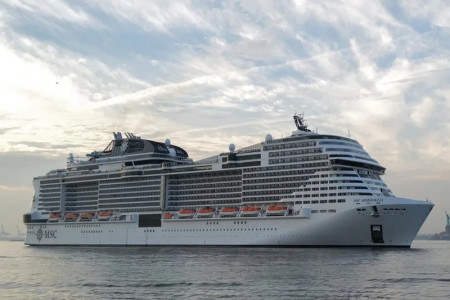French company CMA CGM took a similar step a day after Danish shipping giant Maersk and German transport company Hapag-Lloyd suspended Red Sea journeys.
The decision comes after attacks by Iran-backed Houthi rebels in Yemen.
They say they are targeting ships travelling to Israel.
The Houthis have declared their support for Hamas after Israel launched a military campaign in Gaza following the 7 October Hamas attacks that killed 1,200 people and saw 240 more taken hostage.
Since then, Israel has killed more than 18,000 Palestinians in Gaza, Hamas health officials say.
The Red Sea is one the world's most important routes for oil and fuel shipments.
But the Houthis have been stepping up their attacks, using drones and rockets against foreign-owned vessels.
They have also been firing drones and missiles towards Israel. The US said on Saturday its guided-missile destroyers had shot down 14 Houthi drones in the Red Sea.
In its announcement, MSC said the situation in the area had become "serious".
It said that its container ship MSC PALATIUM III was attacked on Friday as it was transiting the Red Sea. There were no injuries to the crew, but the ship had been taken out of service.
Its ships were being re-routed via the Cape of Good Hope at the southern tip of Africa.
In its statement, CMA CGM - the world's third-largest shipping company - said it had instructed all its container ships there "to reach safe areas and pause their journey in safe waters with immediate effect until further notice".
Maersk, the world's second-biggest shipping firm, has described the situation as "alarming".
"Following the near-miss incident involving Maersk Gibraltar yesterday and yet another attack on a container vessel today, we have instructed all Maersk vessels in the area bound to pass through the Bab al-Mandab Strait to pause their journey until further notice," it told the BBC on Friday.
The four companies that have now suspended operations in the area comprise four of the top five in the world - and shipping experts say the decisions are going to be costly.
"It's security to the crew, to the ship itself and also insurance policies. Premiums are now going sky high if they can get insurance at all, so it's going to have serious implications on stock levels, on costs and the whole dynamics of supply chains," Sue Terpilowski from the Chartered Institute of Logistics and Transport, which represents companies concerned with supply chains, told the BBC.
The added crewing, fuel and insurance costs are all likely to be passed on to consumers, says BBC business reporter Vivienne Nunis.

The Bab al-Mandab strait - also known as the Gate of Tears - is a channel 20 miles (32km) wide, and known for being perilous to navigate.
It sits between Yemen on the Arabian Peninsula and Djibouti and Eritrea on the African coast.
It is the route by which ships can reach the Suez Canal from the south - itself a major shipping lane. Avoiding it means vessels must take much longer routes, for example navigating around southern Africa.
About 17,000 ships and 10% of global trade pass through it every year. Any ship passing through Suez to or from the Indian Ocean has to come this way.
BBC


